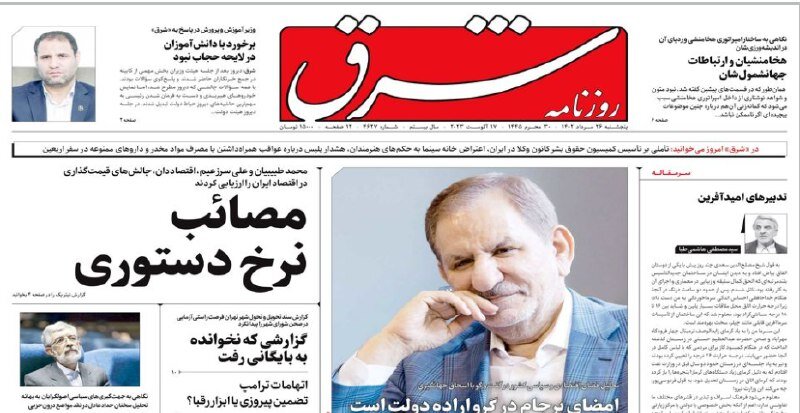Iran-US agreement non-related to other cases

Shargh wrote in a commentary: The Financial Times newspaper, repeating the claim of Ukraine and its Western allies regarding Iran's military support to Russia, wrote that the United States is urging Iran to stop selling drones and the material to make drones in Russia in order to de-escalate tensions.
The U.S. reportedly made the request during indirect talks with Iran that has led to the imminent exchange of at least 5 prisoners and the release of $6 billion of Iran’s blocked assets. The report was published as the U.S. has been trying to de-escalate tensions and return to talks with Iran in order to restore the JCPOA agreement. Iran has said numerous times that it had never sold drones to Russia to be used in the Ukraine war and believes its military interactions with Russia are within the framework of Tehran-Moscow defense relations. Even though some analysts believe the recent agreement between Iran and the U.S. can prepare the ground for a potential revival of the JCPOA, Washington itself has called the two matters unrelated. It believes the recent agreement regarding the exchange of Iranian and American prisoners and the release of Iranian assets in several countries is an independent issue unrelated to other cases.
Sobh-e-No: Hypocrisy of the British embassy
In a note, Sobh-e-No discussed the response of the British ambassador to the terrorist incident in Shiraz. The paper said: The American regime, together with its subordinate countries, including the UK, designed the "Bee's hive" plot to counter the depth of Islamic influence in the region and beyond. After the terrorist incident in Shiraz by ISIS, the British ambassador decided to refrain from calling the attack a terrorist and violent act against people. Had the same thing happened in a church in London, British officials including the British ambassador to Tehran would have called it a terrorist act. Western double standards and the West’s baseless claims of support for human rights which causes discrimination among people of different races and religions, will only result in an increase in terrorism and deepen injustice in the world. On the other hand, the British ambassador's malice and his interference in Iran's internal affairs are visible in his tweet. He has used ambiguous words in his tweet just like the anti-Iranian opposition. It is clear however that when the UK hosts several media outlets which are opposed to Iran, it also has to keep its policies and remarks in line with anti-Iran rhetoric and mimic the words of those outlets.
Iran: Death chain in Ashraf 3
In an analysis, the Iran newspaper discussed the continuation of suspicious deaths of high-ranking members of MKO and the tensity of their organizational situation. It wrote: Another death of a high-ranking member of the MKO. A member, named Munir Dej, has been declared dead, confirming suspicions that a serial and systematic killing spree is taking place. Several other high-ranking members of the MKO have died in recent weeks. It seems that a possible prosecution of the key members in both Albania and Iran has caused panic among MKO members and made several of them want to leave. The group itself has declared that Munir Dej took her own life but many believe that is a made-up story to cover her murder. It seems that the unpleasant situation that the MKO is facing overseas might urge more members to leave the terror organization and hence the heads of the entity will continue to take more lives in order to cleanse the system from elements it considers problematic and undesirable.
Ham Mihan: October is a flashpoint
In a commentary, Ham Mihan wrote: Some analysts believe that the recent negotiations between Iran and the United States can form the basis for greater negotiations and a more serious agreement, an agreement whose content is not the revival of JCPOA but the next U.S. plans to control Iran in exchange for reducing some sanctions. Even if the U.S. can follow the negotiations for a few months, October 2023, when UN limitations on Iran's ballistic missiles expire, is a flashpoint, and the only option Western leaders see to avoid its expiration is a snapback. However, this option might force Iran to quit the Nuclear Non-Proliferation Treaty (NPT), a potential dilemma for the United States and Israel that would risk escalating tensions across the region. Now, Iran, America and the larger international community have to make a serious decision and take a step towards some kind of agreement or at least to prevent further tension.
Leave a Comment